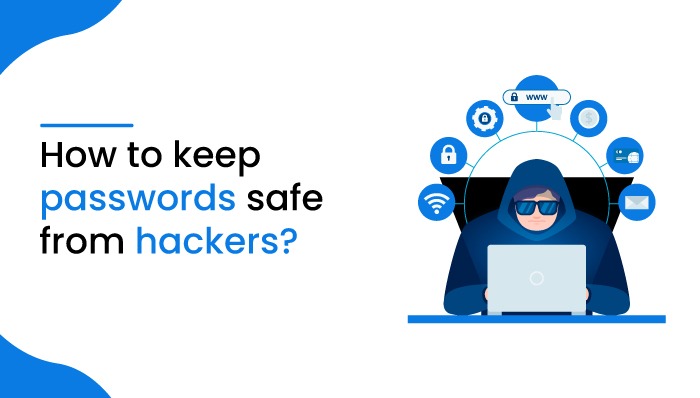How To Keep Passwords Safe From Hackers?

How To Keep Passwords Safe From Hackers?
Nowadays, through some simple loopholes, many people and being the victim of hacking. Anyone that uses an electronic device linked to the Internet is vulnerable to the threats posed by computer hackers and cyber predators. Hackers are getting more and more advanced, because of which it has been hard for us to keep our passwords safe.

By using various kinds of attacks, hackers get access to your social media, email, and bank account passwords, which leads to stealing your private information, bank money, identity theft, and illegal sale of your information.
Therefore to protect yourself from being hacked, you have to learn to keep your passwords safe from hackers. In thing blog, I will explain the dangers of being hacked, how hackers steal your passwords, and how to keep your passwords safe from hackers.
Why it’s easier for hackers to hack?
The reuse of passwords makes it easier for hackers to hack. More than 60% of people use the same password for multiple sites. People find it easy to remember the same password for all accounts and keep it for a long time.
And the next one is a predictable password. Hackers can easily guess the password if it is foreseeable. Most of all, put the passwords related to your lives, such as names of family members and birthdates.
Dangers of Being Hacked
Due to the internet, it is difficult o keep your passwords safe from hackers. When your phone or other device is connected to the Internet, malware built by a hacker on your computer secretly transmits your personal and financial information without your permission or consent. Alternatively, a hacker could prey on the private information you inadvertently divulged.

You easily be the victim of identity theft once you are hacked. Once you’ve been hacked, the hacker has access to your usernames, passwords, and valuable personal information. They can steal your money, open credit cards and bank accounts under your name, and destroy your credit. Hackers can order new account PINs or extra credit cards in your name and make transactions in your name.
Hackers may also add themselves or another user they manage as authorized users, making it easy to use the credit to get cash advances. They can use and misuse your Social Security number. They can even sell the information to third parties for illegitimate or unlawful purposes.
How Can Hackers Access Your Passwords?
Hackers can use various attacks to access your passwords. Some of the attacks that hackers use are listed below:
Phishing Attack
 Phishing attacks are the types of attacks where the hacker uses an email or a website to trick you into giving your data or credentials. Hackers send you an email that looks very familiar to known email. The email can seem as if it is sent to you from your workplace, or by your friends and families, or by Google itself. Without giving any thought, you click the link or attachment on that email, and your password and other data get hacked.
Phishing attacks are the types of attacks where the hacker uses an email or a website to trick you into giving your data or credentials. Hackers send you an email that looks very familiar to known email. The email can seem as if it is sent to you from your workplace, or by your friends and families, or by Google itself. Without giving any thought, you click the link or attachment on that email, and your password and other data get hacked.
The hacker creates a copy of the legitimate website’s login page and redirects it to a credential-stealing page or script. The changed files are then packed together in a zipped file known as a phishing kit. The hacker posts the zipped files are hacked website and unzips them again. Finally, the hacker gives the victims an email containing links to the latest spoofed website.
For example, a hacker can send you an email to change your Gmail password as if sent from Gmail settings itself. When you click on the link from the mail, it redirects you to a fake website that looks like a replica of the Gmail login page. When you enter your login credentials, like your email and password, the hacker gets access to it.
Read More: How to be safe from phishing sites?
Brute Force Attack
Brute Force is a hit-and-trial method of hacking where the hackers make excessively forceful attempts to guess your password to get their way into your account. Hackers try to use all possible variations in the hopes of making the right guess. In brute force attacks, cracking a password can take anything from a few seconds to several years, depending on its duration and difficulty.
Keylogger Attack
A keylogger is a software application that records a user’s keystrokes. Hackers use keystroke loggers to monitor what you type into a website or application and give it back to them. Keyloggers use algorithms that use pattern recognition and other techniques to track keystrokes.
A keylogger can make it very easy for hackers to access your password. It can keep a record of every single letter you type on your keyboard. Hence when you type your email and passwords of your social media, bank account, or mail account, the keylogger can record and keep the log of information and send it back to the hacker.
Dictionary Attack
A dictionary attack is an easy hacking method of breaking into password-protected applications or computers by systematically inserting every word in a dictionary as a password. It is also used to determine what key is required to decrypt a letter or record that has been encrypted. A dictionary attack is a successful hacking tool when the passwords are derived from a dictionary.
Spider Attack
Spider attacks occur as hackers learn a company’s common language, such as its brand name, and use it to infer passwords like mycompany1234. They could look up details on a website and use it to crack the company’s wi-fi passwords.
How to Keep Passwords Safe From Hackers?
Use Strong Passwords
To avoid someone hacking you through brute-force, dictionary, or spider attacks, you should use strong passwords. It’s best to use a password of at least 14 letters. A password should never be less than eight characters. Be sure to use a wide range of characters, numbers, random combinations of uppercase and lowercase letters with no apparent connection to you or your interests.
Avoid using letter capitalization in repetitive patterns, such as at the start or end of the password or proper nouns. Hackers are aware of these patterns and would target the most commonly used characters. Therefore, you should remember to use the full keyboard often rather than just the characters you use the most.
Check any Email You Receive Carefully Before You Click on its Attachment
When you get an email from someone, whether from your employer, your bank, or your friends and relatives, don’t reply or act on it right away. Analyze the email for a moment. Check email addresses for spelling and grammatical errors. Hackers often use email addresses almost identical to the names of well-known firms or corporations but with minor differences.
Suppose you know the email ‘[email protected]’. The hacker then sends ‘[email protected],’ with some attachment to it. Both emails can appear identical to the recipient at first glance. However, if you look closely, you can see that the changed email address has an extra ‘l’ at the end, indicating the fake one.
The receiver responds to the message without thought and clicks on the URL, allowing hackers to hack him. When you click on the attachment sent from a fake email, the hacker can redirect to their website or download and install spy apps or keyloggers on your device, which can keep a log of your social media passwords, bank accounts, and your mobile activities.
Check if the Login Page is Legitimate Before You Enter Your Credentials
The hackers can redirect you to pages similar to your back account login page, social media login page, or other kinds of login pages. When you enter your login credentials, the hacker can quickly get access to it.
Like the fake mail, instead of ‘gmail.google.com,’ the hacker will redirect to ‘gmall.gooogle.com,’ and when you enter the information, the hacker will steal all your data and password. Therefore, you must be aware of the minor modifications that the hacker uses to deceive you.
Never Note Down Your Passwords
It would be best if you never wrote down your password in Notepad, Word, or other similar kinds of files. People can quickly get access to these files, and once they get access, they can know your login credentials and essential information.
Use password manager
Instead of writing down your passwords, use a password manager like Myki, Last Pass, Bitwarden, Dashlane, or Sticky Password to keep track of your passwords. You may use these apps to create and store complex passwords. Password managers are programs that run in your browser and automatically fill in your username details anytime you visit a website.
The password manager holds track of passwords of all of your accounts; you don’t need to remember them. So that you can put strong and different passwords for all accounts without worrying about memorizing them. But definitely, you need to remember the master password because it grants you access to your “Password Manager.”
Two-Factor Authentication
Use two-factor authentication to save yourself from hackers attacking you. Even if the hackers crack your password, the two-factor authentication requires another authentication to grant permission to access your account. The other authentication can be a pin sent to your mobile phone or a verification attachment sent to your email. Hence two-factor authentication protects your account from breaches by hackers.
In addition to these threats, email providers and social networking sites have begun to provide two-factor authentication in recent years. When attempting to log on to their emails, this prompts them for an external entry point, such as a text message sent to their cell phone.
Change Passwords Periodically
Updating your password on a timely basis is one of the best ways to stay one step ahead of hackers. If your password remains the same, hackers can use various attack methods. Like brute force or dictionary and eventually, figure it out one way or another. But if you keep changing your password, the hacker can’t keep up with these changes making it difficult to crack it.
Biometric Authentication
Biometrics uses a fingerprint, face, speech, or retinal scan to recognize and grant access to a user. Biometric authentication has the apparent benefit of not being “guessed.” You can use it in smartphones to provide users with access through fingerprint and face recognition. You can also use fingerprint biometrics in mobile payment transactions.
Each fingerprint, retina, face, or voice in biometric authentication is unique to the user. It can be useful for uses such as two-factor authentication. Some cell phones, for example, can require fingerprint recognition and passcodes to gain access.
Do Not Reuse Passwords
When you are changing your password or creating a new account, do not use old passwords. It is one of the most naïve ways someone can hack you. Always try to use a new strong password with uppercase, lowercase, special symbols, and numbers. Do not use specific patterns which don’t represent and aren’t similar in any way to your old password.
Conclusion
Hackers can use various schemes like phishing, brute force attack, keylogger attack, dictionary attack. These attacks access your password and breach your social media or bank accounts. Once the hackers access your password, they can get your valuable information. These online scammers can steal your money, open credits, and purchases in your name. They can even sell your information to other parties for illegal purposes. Therefore, you should protect your passwords from getting hacked.
To keep your passwords safe from hackers, you should use strong passwords with uppercase, lowercase, special symbols, and numbers with no specific patterns. Use two-factor and biometric authentications when possible. Carefully check the emails you receive and the login page where you enter your credentials. Try changing passwords periodically and use a password manager tool to create and store complex passwords.



 WhatsApp Spy
WhatsApp Spy Facebook & Messenger Spy
Facebook & Messenger Spy Viber Spy
Viber Spy Instagram Spy
Instagram Spy Skype Spy
Skype Spy TikTok Spy
TikTok Spy Telegram Spy
Telegram Spy LinkedIn Spy
LinkedIn Spy Twitter Spy
Twitter Spy Youtube Spy
Youtube Spy Photo Spy
Photo Spy Video Spy
Video Spy Calls and Contacts Tracking
Calls and Contacts Tracking SMS & IM Chats
SMS & IM Chats Voice Capture
Voice Capture Image Capture
Image Capture Video Record
Video Record